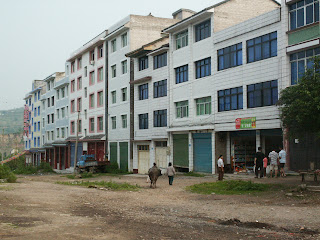The BBC (
article here) and several other news websites (but not Xinhua) are reporting on an article that appeared in Biology Letters, suggesting the Yangtze River dolphin, also called
baiji, is now considered extinct. The last one was spotted in 2004, and a scientific survey in 2006 failed to turn up any sign of the dolphin. The traditional range was in the river from the mouth as far west as Yichang, with most of the population in the middle Yangtze near Dongting and Poyang Lakes. The last captive dolphin died in 2002.

The World Conservation Union (IUCN) has noted the following as threats to the species: a period of hunting by humans during the Great Leap Forward, entanglement in fishing gear, the illegal practice of electric fishing, collisions with boats and ships, habitat loss, and pollution. During the Great Leap Forward, when traditional veneration of the Baiji was denounced, it was hunted for its flesh and skin, and quickly became scarce.
As China developed economically, pressure on the river dolphin grew significantly. Industrial and residential waste flowed into the Yangtze. The riverbed was dredged and reinforced with concrete in many locations. Ship traffic multiplied, boats grew in size, and fishermen employed wider and more lethal nets. Noise pollution caused the nearly blind animal to collide with propellers. Stocks of the dolphin's prey declined drastically in recent decades as well, with some fish populations declining to one thousandth of their pre-industrial levels.
In the 1970s and 1980s, an estimated half of Baiji deaths were attributed to entanglement in fishing gear. By the early 2000s, electric fishing was considered "the most important and immediate direct threat to the Baiji's survival." Though outlawed, the destructive fishing technique is widely practised throughout China. The building of the Three Gorges Dam further reduced the dolphin's habitat and facilitated an increase in ship traffic. (text in italics from Wikipedia)
Officially a species cannot be termed extinct until 50 years after the last sighting, so this species is termed 'functionally extinct'. Terminology doesn't really matter here, what does is the fact that it appears to be directly linked to environmental issues, including fishing practices, water pollution, habitat losses, and the construction of large dams such as Gezhouba and the Three Gorges. A shame really.
 But no, comments appear to be from all ends of the spectrum, admittedly with a nationalistic hue.
But no, comments appear to be from all ends of the spectrum, admittedly with a nationalistic hue.
